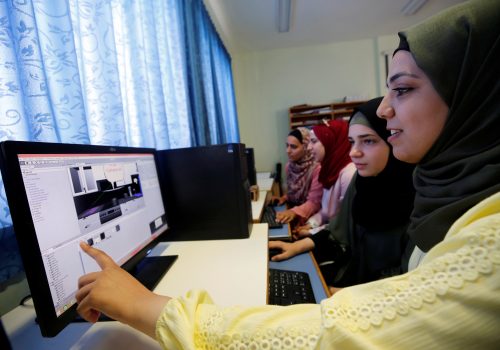Absence of PhD programs contributes to weak research and development in the Gulf
Economists have been studying how to improve an economy’s performance for centuries, resulting in the formulation of two basic principles: 1) the level of technological advancement is a key determinant of living standards and 2) the volume of resources allocated to research and development (R&D) is a key determinant of the rate of technological improvement.
Looking to history, we see the validity of these two principles. During the Golden Age of Islamic civilization (750-1250 AD), when the Gulf countries were part of the Abbasid caliphate, most of the desired elements of a technologically dynamic society were present; most notably, high levels of public and private spending on research. The result was pivotal advances in sciences and many other important fields and unprecedented levels of economic growth in the Arabian region.
Despite their high per capita incomes, the Gulf countries today have low levels of R&D spending. According to the latest available UNESCO data, Kuwait, Oman, and Qatar collectively allocate $3 billion per year to R&D. In contrast, US tech companies such as Amazon, Intel, and Novartis individually spend more than $10 billion per year on R&D. The low levels of innovation we see in Gulf Cooperation Council (GCC) countries impede long-run economic growth and the ability to diversify their economies. While the underlying causes are complex, this article examines one component: the weaknesses of PhD programs in Gulf countries.
Low R&D, low innovation
In 2013, the average level of R&D spending as a percentage of GDP in the world was 2.1 percent, according to the World Bank. The Gulf countries’ corresponding figures were not very encouraging: 0.1 percent for Bahrain, 0.3 percent for Kuwait, 0.2 percent for Oman, 0.5 percent for Qatar, 0.1 percent for Saudi Arabia, and 0.7 percent for the UAE.
The low levels of Gulf R&D are reflected in low levels of innovation. For example, in 2018, out of the 2.3 million total patent applications in the world, the contributions of the Gulf countries were eleven for Bahrain, one for Kuwait, four for Oman, nineteen for Qatar, 1,078 for Saudi Arabia, and fifty-six for the UAE. In other words, the GCC countries collectively accounted for around 0.7 percent of the world’s population, yet only 0.05 percent of the share of patents. While patents are undoubtedly an imperfect gauge of innovation, a similar picture emerges for alternative indicators, such as industrial designs, the output of scientific papers, or the international ranking of the region’s universities.
Attracting the world’s top talent is important for innovation, but only if that talent is permanently integrated into the economy. In the Gulf countries, the problem of low innovation is exacerbated by the fact that much of it is performed by migrant workers temporarily in the country. This means that much of their knowledge will return with them once they return to their home country. For example, the King Abdullah University of Science and Technology (KAUST) in Saudi Arabia proudly reports that it has the highest citation rates per faculty member in the world. Yet, according to Google Scholar, none of the top fifty faculty are Saudi citizens. In contrast, though leading scholars working in innovation powerhouses such as the United States and Switzerland may arrive as foreigners, many will earn citizenship and remain there for the rest of their lives, contributing to the accumulation of knowledge in the country.
Weak PhD programs
The production of new knowledge is a very complex process and many factors contribute to the low levels of innovation exhibited by the Gulf countries. One factor that plays a role is the structure of tertiary education—particularly PhD programs. Countries that realize high levels of technological progress typically possess certain characteristics. First, their universities’ primary mission is the production of cutting-edge research, with teaching tacitly being a way of funding the research conducted by the faculty. This is reflected in small teaching loads for professors, which can be as low as two courses per semester for an assistant professor and even lower in elite universities. Second, there is a large number of full-time PhD students who improve the research productivity of the faculty. They perform the more time-intensive elements of research, such as gathering and cleaning data. They also grade the assignments of undergraduates and often teach entire courses, allowing professors to focus on writing papers and attending conferences.
In contrast, in the Gulf countries, these characteristics are largely absent. In the eyes of a Gulf government, the job of a university is to teach, with research relegated to a secondary purpose. As a result, faculty often have mammoth loads of five courses per semester—even at the level of associate or full professor—depriving them of the time and concentration required to produce cutting-edge research.
In addition, there is a very low incidence of PhD programs, preventing faculty from accessing an important input into the research production chain and further increasing the teaching burden. Moreover, when students in Gulf countries enroll in PhD programs, they usually insist on doing their full-time job while pursuing the degree part-time or full-time during evenings and weekends. This means that they are incapable of supporting faculty research efforts, whether that’s through directly performing the time-intensive elements or by teaching undergraduates.
Why do PhD students attempt the herculean task of getting a doctorate while doing a full-time job and often raising a family? This is partially an issue of funding; stipends are either small or completely absent, which is a symptom of low R&D spending. However, the students themselves sometimes exhibit the “wrong” attitude and pursue a PhD for credentialism, seeking the prestigious title of “Dr.” instead of research skills and contributions to the field. For many Gulf PhD students, their dissertation is the last piece of research they will ever do. In technologically advanced countries, a PhD thesis represents the first of many publications for those seeking a doctorate.
How can innovation be improved?
The tempting solution to this problem is to throw money at it—increase spending on PhD programs, on graduate stipends, on research grants, and so on. Yet this is unlikely to be effective for two reasons. First, in the current economic climate with low oil prices, the funds might not be available. Budget deficits and public debts in the Gulf countries are large and rising, exacerbated by the coronavirus pandemic. Second, even if the requisite funds are marshalled, the best-case outcome is a significant increase in the production of scientific papers. Transforming this into the sort of technological progress that improves living standards requires addressing deficiencies in other components of the knowledge production chain, such as primary and secondary education, intellectual property, venture capital, and so on.
Consequently, policymakers should consider taking a more holistic approach to improving innovation. Notably, the countries that do excel in innovation have very high percentages of R&D spending coming from private sources, with publicly-funded R&D often yielding unproductive esoteric research that has no discernable impact on living standards. The latter is reflected in the large volume of research funds allocated to the humanities in public universities, leading to wave after wave of PhD students who are unable to secure livelihoods that relate to their specialization. This should make the Gulf governments pause before they simply pump public funds into research. Policymakers need to understand why so many PhD students in countries such as the United Kingdom are funded by industry and why the high-quality research produced by professors in the UK is often dependent upon grants from the private sector.
Which policies should the Gulf countries implement?
In terms of concrete reforms, the Gulf countries need to build on their existing ability to attract top global talent by creating a path to permanent residency and possibly citizenship. This will help ensure that first-rate researchers have an incentive to transfer knowledge to local economies they work in and invest in building scientific communities that are a prerequisite for sustainable technological advancement. During the aforementioned Golden Age, the scientific environment was characterized by elite cosmopolitan research teams whose members were all permanently settled in Abbasid lands, possessing no plans to return home upon the expiration of a guest worker visa.
Beyond this, policymakers should ensure that a much higher percentage of PhD students are working exclusively on their research, rather than juggling their PhD and a job. They need to emulate the Abbasid model of apprentices working under scholars in the pursuit of knowledge and skills, rather than degrees on paper. Boosting student stipends would help, as would tackling some of the superficial credentialism in the Gulf public sectors.
Finally, universities need to adjust their missions so that the production of knowledge is the priority. Teaching must always be important, but the primary function of top scholars should be the production of cutting-edge research, not grading undergraduate quizzes.
Dr. Omar Al-Ubaydli is the Director of Research at the Bahrain Center for Strategic, International and Energy Studies in Bahrain. Follow him on Twitter: @omareconomics.
Sign up here to learn more and receive the latest updates on empowerME events, publications, and podcast.
Sign up here to learn more and receive the latest updates on empowerME events, publications, and podcast.
Image: United Arab Emirates' Minister of Higher Education and Scientific Research and President of Zayed University Sheikh Nahyan bin Mubarak Al Nahyan (R) sits with Britain's Prime Minister David Cameron (L) during a discussion with students at Zayed University in Abu Dhabi November 5, 2012. REUTERS/WAM/Handout


